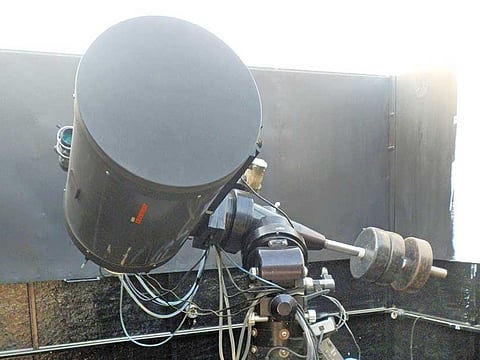It’s all in the stars
Group of six aims to make country ‘astronomy paradise’

LAHORE
More often than not news emanating from Pakistan usually revolves around politics, terrorism or cricket — never science or space. But things are now changing as more and more people are turning their eyes to distant stars, the sun, the Milky Way and galaxies far away — the final frontier for mankind.
As people’s interest in space observation spikes up, the Space Science department in the University of Punjab in Lahore has been attracting a number of students. The Lahore Astronomical Society has drawn up a calendar of activities around the year to create interest and spike awareness among people about various aspects of space and the cosmos.
Pioneering effort
Umair Asim who has done his Masters in Astronomy from James Cook University, Townsville, Australia, founded the Lahore Astronomical Society and is also CEO of Zeds Astronomical Observatory, pioneering efforts in putting Pakistan on the global astronomy map. “We have public outreach programmes to share the passion of astronomy with the general public especially among school, college and university students,” he said.
“The Sun observation programme is widely popular among students and was sponsored by Charlie Bates Solar Astronomy Project, a non-profit organisation in USA, which has donated equipment, solar glasses and other accessories to assist LAST.
“Hamaari Kainaat (our universe) podcast is a regular podcast developed by me and Dr Salman Hameed (Hampshire College USA). We talk about astronomy and space in Urdu,” Umair said.
“Pakistan has been considered a dark region when it comes to data generation in the field of astronomy but all is not lost. Ours is the only observatory which is registered with the International Astronomical Union (IAU) and contributes to the international community when it comes to monitoring asteroids. So we are pretty much into astronomical data generation and building Pakistan’s image,” Umair said.
House to observatory
Umair has converted his large house in the uptown area of DHA (Defence Housing Authority) into a proper observatory. What must have once been his drawing room is now a briefing room where interactive sessions are held with visitors on a weekly basis. Umair and his team including secretary general Ruhsan Bukhari and Ameenah who deals with PR, often visit different institutions to give briefings on astronomy.
The main telescope, a Celestron c14, developed in the US and the only such device in the country, monitors celestial bodies like planets, stars, comets and other galaxies and can also check chemical compositions and capture images of celestial bodies.
The telescope also contributes to data collection and sharing it with the international community of astronomers who are only to eager for the data given the unique longitude and latitude of the observatory. The group of six volunteers working under Umair’s leadership are trying to make Pakistan a true ‘astronomical paradise’.
“Pakistan’s northern areas are ideal for astronomy but due to security concerns over gadgets and telescopes and very little infrastructure, we cannot explore the wonders of sky from there,” Umair explained.
A passion
An educator by profession, Umair does not consider astronomy as just a profession but a heartfelt passion. “Since childhood the sky and the stars fascinated me. I loved to lie down and watch the stars as long as I could before drifting off to sleep. The passion for astronomy did not die with the passage of time and one day I was able to buy one of the most expensive telescopes in Pakistan,” Umair said. With a 14-inch aperture the Celestron c14, bought in 2003 for Rs3 million (Dh104,983), is one of the biggest telescopes in Pakistan and is used for research and collecting data.
“Its light-gathering power and capacity is excellent and that’s why international astronomers contact us and send queries about certain asteroids.
While the capacity of the human eye for light gathering is 5mm to 7mm, the capacity of the Celestron c14 is an incredible 365mm that allows it to perfectly capture light from far flung stars and planets.
The telescope monitors stars, comets and asteroids’ chemical composition, measuring hydrogen and other components even though the objects may be billions of kilometres away from earth and located in the remotest corners of the solar system or outside. A view of the planet Jupiter with its four prominent moons through the telescope is breathtaking.
Umair said: “Astronomy is divided into data observation (observation astronomy) and data interpretation. We focus on data observation. The scope of photometry astronomy is being observed and practised here at this observatory.
Visual astronomy
“In Karachi there is a lot of visual astronomy as groups of people go to the beach and observe the stars and skyline with telescopes. It is all very fascinating,” Umair said with a smile.
With enthusiasts like Umair around there are expectations that more and more people will turn their gaze to the skies and raise Pakistan’s star in the field of astronomy.


